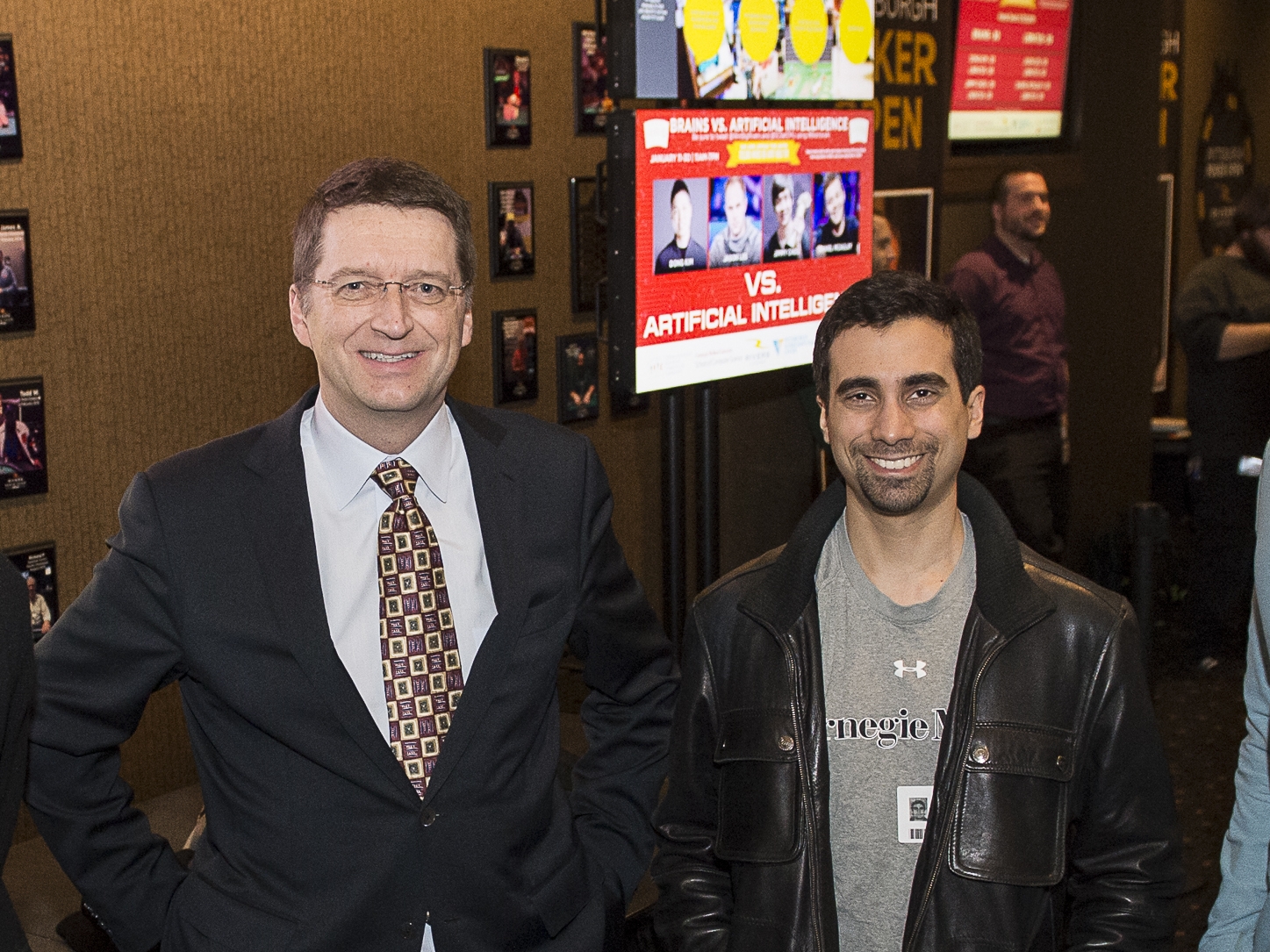Sandholm, Brown To Receive Minsky Medal The Duo's Libratus AI Program Was the First To Beat Top No-Limit Poker Professionals
Byron SpiceTuesday, November 6, 2018Print this page.

Computer Science Professor Tuomas Sandholm and Noam Brown, a Ph.D. student in the Computer Science Department, are the second-ever recipients of the prestigious Marvin Minsky Medal, which will be presented by the International Joint Conference on Artificial Intelligence (IJCAI) in recognition of their outstanding achievements in AI.
Sandholm and Brown created Libratus, an AI that became the first computer program to beat top professional poker players at Heads-Up No-Limit Texas Hold'em. During the 20-day "Brains vs. Artificial Intelligence" competition in January 2017, Libratus played 120,000 hands against four poker pros, beating each player individually and collectively amassing more than $1.8 million in chips. The feat has yet to be duplicated.
"Poker is an important challenge for AI because any poker player has to deal with incomplete information," said Michael Wooldridge, a professor of computer science at the University of Oxford and chair of the IJCAI Awards Committee. "Incomplete information makes the computational challenge orders of magnitude harder. Libratus used fundamentally new techniques for dealing with incomplete information which have exciting potential applications far beyond games."
This is just the second time that the IJCAI has awarded the Minsky Medal. The inaugural recipient was the team behind DeepMind's AlphaGo system, which beat a world champion Go player in 2016. The award is named for Marvin Minsky, one of the founders of the field of AI and co-founder of MIT's Computer Science and AI Laboratory. It will be presented at the IJCAI 2019 conference in Macao, China, next August.
"Marvin Minsky was a big, broad thinker and an AI pioneer. We are proud to receive the medal in his name," Sandholm said. "Computational techniques for solving imperfect-information games will have large numbers of applications in the future, since most real-world settings have more than one actor and imperfect information. I believe that this is a tipping point toward applications now that the best AI has reached a superhuman level, as measured on the main benchmark in the field."
Libratus did not use expert domain knowledge or human data specific to poker. Rather, the AI analyzed the game's rules and devised its own strategy. The technology thus could be applied to any number of imperfect-information games. Such hidden information is ubiquitous in real-world strategic interactions, including business negotiation, cybersecurity, finance, strategic pricing and military applications.
"We appreciate the community's recognition of the difficult challenges that hidden information poses to the field of artificial intelligence and the importance of addressing them," Brown said. "We look forward to applying this technology to a variety of real-world settings in a way that will have a positive impact on peoples' lives."
Sandholm said he believes so strongly in the potential of this technology that he has founded two companies, Strategic Machine Inc. and Strategy Robot Inc., which have exclusively licensed Libratus' technology and other technologies from Sandholm's lab to create a variety of commercial applications.
Sandholm, a leader of the university's CMU AI initiative, is the first recipient of Carnegie Mellon University's Angel Jordan Professorship in Computer Science. He also founded and directs the Electronic Marketplaces Laboratory and Optimized Markets Inc.
Sandholm joined CMU in 2001, and works at the convergence of AI, economics and operations research. His algorithms run the nationwide kidney exchange for the United Network for Organ Sharing, autonomously making the kidney exchange transplant plan for 69 percent of U.S. transplant centers each week.
One of his startups, Optimized Markets Inc., is bringing a new optimization-powered paradigm to advertising campaign sales and scheduling in television, streaming video and audio, internet display, mobile, game, radio and cross-media advertising. Through a prior startup he founded, he fielded 800 combinatorial electronic auctions for sourcing, totaling $60 billion.
Sandholm's many honors include a National Science Foundation CAREER Award, the inaugural Association for Computing Machinery (ACM) Autonomous Agents Research Award, a Sloan Fellowship, an Edelman Laureateship, and the IJCAI's Computers and Thought Award. He is a fellow of the Association for Computing Machinery, Association for the Advancement of Artificial Intelligence, and Institute for Operations Research and the Management Sciences. He holds an honorary doctorate from the University of Zurich.
Before undertaking his doctoral studies at CMU, Brown worked at the Federal Reserve Board in the International Financial Markets section, where he researched algorithmic trading in financial markets. Prior to that, he developed algorithmic trading strategies.
At CMU, where he is advised by Sandholm, Brown has developed computational game theory techniques to produce AIs capable of strategic reasoning in large imperfect-information interactions. He is a recipient of an Open Philanthropy Project AI Fellowship and a Tencent AI Lab Fellowship. Brown and Sandholm have shared numerous awards for their research, including a best paper award at the 2017 Neural Information Processing Systems conference, the Allen Newell Award for Research Excellence and multiple supercomputing awards.
Byron Spice | 412-268-9068 | bspice@cs.cmu.edu
